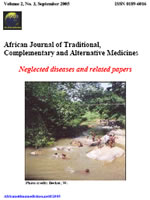
|
African Journal of Traditional, Complementary and Alternative Medicines
African Ethnomedicines Network
ISSN: 0189-6016
Vol. 13, No. 6, 2016, pp. 144-148
|
 Bioline Code: tc16152
Bioline Code: tc16152
Full paper language: English
Document type: Research Article
Document available free of charge
|
|
|
African Journal of Traditional, Complementary and Alternative Medicines, Vol. 13, No. 6, 2016, pp. 144-148
| en |
SELECTIVE INHIBITION OF HEPATITIS C VIRUS REPLICATION BY ALPHA-ZAM, A NIGELLA SATIVA  SEED FORMULATION SEED FORMULATION
Oyero, Olufunmilayo G.; Toyama, Masaaki; Mitsuhiro, Naoki; Onifade, Abdulfatah A.; Hidaka, Akemi; Okamoto, Mika & Baba, Masanori
Abstract
Background: Hepatitis C virus (HCV) infection became curable because of the development of direct acting antivirals (DAAs).
However, the high cost of DAAs has greatly impeded their potential impact on the treatment of HCV infection. As a result, hepatitis C
will continue to cause substantial morbidity, and mortality among chronically infected individuals in low and middle income countries.
Thus, urgent need exists for developing cheaper drugs available to hepatitis C patients in these countries.
Materials and Methods: Alpha-zam, an indigenous herbal formulation from Nigella sativa seed, was examined for its anti-HCV activity
and cytotoxicity in genotype 1b HCV replicon cells. The antiviral activity was determined by luciferase expression and viral RNA
synthesis, while the cytotoxicity was assessed by viable cell number and glyceraldehyde-3-phosphate dehydrogenase RNA synthesis in
the replicon cells.
Results: Alpha-zam was found to be a selective inhibitor of HCV replication. The 50% effective dilution and 50% cytotoxic dilution of
Alpha-zam were 761- and < 100-fold, respectively, in the subgenomic replicon cells LucNeo#2. Its selective inhibition of HCV was also
confirmed by HCV RNA levels in LucNeo#2 and in the full-genome HCV replicon cells NNC#2 using real-time reverse transcriptase
polymerase chain reaction. Furthermore, the anti-HCV activity of Alpha-zam was not due to the induction of interferon.
Conclusion: Alpha-zam selectively inhibits HCV replication and therefore has potential for a novel antiviral agent against HCV
infection.
Keywords
Alpha-zam; chronic hepatitis; hepatitis C virus; antiviral assay; Nigella sativa
|
| |
© Copyright 2016 - African Journal of Traditional, Complementary and Alternative Medicines
Alternative site location: http://journals.sfu.ca/africanem/index.php/ajtcam
|
|
